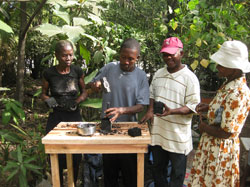
| Vol.
XXII No.
3 January / February 2010 |
| contents |
| Printable Version |
Short- and Long-Term Responses to the Tragedy in Haiti
I too have asked those questions. What can I do? What can I give? How can I serve? And the answers have been frustratingly slow in coming. D-Lab does development, and, traditionally, this is very different from relief. And so the answers have not been jumping out at me. But then, as the dust settled, quite literally, some things became clear. For several years, we’ve been working on developing a method for producing charcoal from agricultural waste materials as a means of addressing the severe deforestation in Haiti, and to create opportunities for income generation for people living in deep poverty.

(click on image to enlarge)
We’ve been focusing in two areas: the southwest, in the area around Les Cayes, and the central plateau. Neither area sustained infrastructural damage from the earthquake, but the widespread reverse migration from Port-au-Prince to rural areas that has followed is having a major impact. We hope to work with our colleagues to ramp up charcoal production, so that the tragedy of the earthquake does not become an additional tragedy for the environment as fuel demand and food prices sky-rocket. So we are looking at providing the resources to triple (at least) production in the southwest and central plateau, and for mechanisms for this fuel to get to Port-au-Prince.
Water is another basic need, and safe drinking water is in alarmingly short supply. We are working with a colleague at the Center for Disease Control (CDC) to provide low-cost water testing equipment to support this effort. We are also developing a low-cost, small-scale rainwater harvesting system. This will be the first project in the D-Lab: Design class this semester, as we challenge our students to put their hands and minds to the task of developing the system.
Conventional harvesting methods require large, expensive storage vessels or construction; with this system, water is stored in inexpensive plastic bags, each of which has a fitting that can be hooked up to different attachments for drinking, cooking, hand washing or irrigation. Families will be able to purchase as many bags as they can afford, adding to their storage capacity as they save money by not having to purchase water, or earn money through dry season farming.
Finally, in the longer term, we will be focusing in two other areas. The first is Creative Capacity Building, a concept that we have been developing over the last few years, in which communities are trained and supported in the design process with the goal of empowering them to be creators of technology, not just users or recipients. We have been working in Uganda with communities that are moving back to their villages after decades of living in relief camps, and we believe that this can be an important tool for helping Haitians to rebuild their lives and livelihoods in the coming months and years.
The second focus is on identifying and developing technologies that can be used to generate income in the rural and semi-rural areas. It is unclear whether the tens of thousands of people who have fled Port-au-Prince for rural areas will stay, what type of work will be available, and how communities already struggling on the margins will be able to sustain this sudden population increase. Just as the economic recovery in the U.S. depends upon jobs, sustainable incomes will be essential to Haiti's recovery and growth.
One definition of 'crisis' is, “a time when an important decision must be made.” In this sense, the people of Haiti are not alone in this moment of crisis. Whether it be supporting the work of others, or doing the work ourselves, this is a time for us to think deeply about what we will do.
As Daniel Berrigan said, “One cannot level one's moral lance at every evil in the universe. There are just too many of them. But you can do something, and the difference between doing something and doing nothing is everything.”
| Back to top | |
| Send your comments |
| home this issue archives editorial board contact us faculty website |